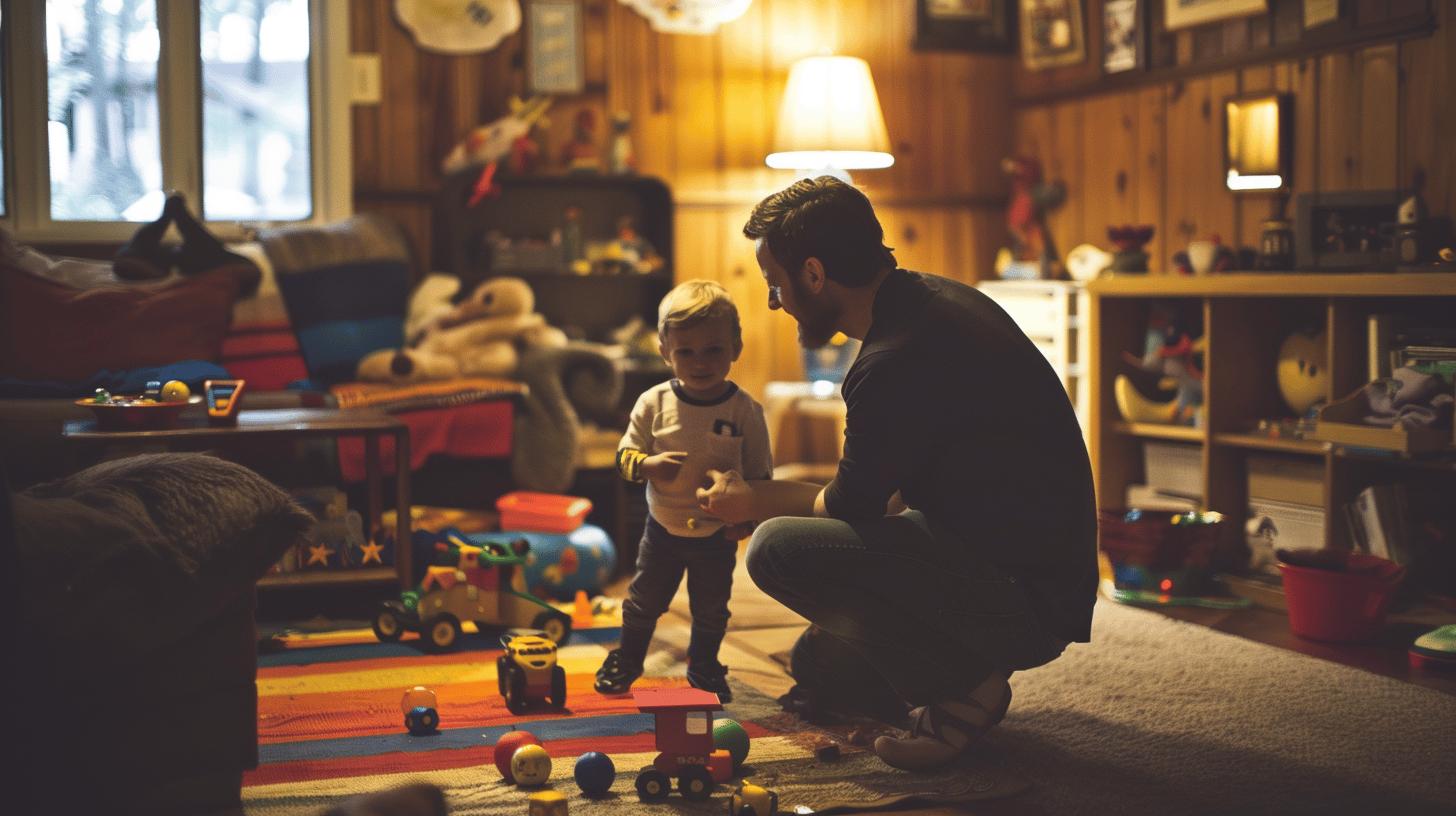What makes a parent truly 'good'? Is it strict rules, endless patience, or something more profound? Understanding the qualities of good parenting goes beyond basic care; it’s about fostering an environment where children thrive. In this insightful article, Heads Up Mom outlines the essential traits that contribute to happy and well-adjusted kids. From patience and empathy to effective communication, discover how mastering these qualities can transform your parenting approach and positively impact your child’s growth. Dive in to learn how you can become the parent your child needs.
Patience: A Pillar of Good Parenting
Patience is the ability to remain calm and composed, especially during challenging situations. In parenting, patience is essential as it allows children to learn and grow at their own pace. By being patient, parents can manage their frustrations and guide their children without undue pressure.
Patience helps parents deal with daily challenges and long-term development. It enables them to handle tantrums, sibling rivalries, and other stressful situations effectively. This consistent patience contributes to a stable and supportive environment, fostering a child’s emotional and mental growth.
- Practice mindfulness: Stay present and focused on the moment.
- Set realistic expectations: Understand that children need time to learn.
- Take breaks: Step away briefly when feeling overwhelmed.
- Use positive self-talk: Remind yourself to remain calm.
- Build a support network: Seek help and advice from other parents.
Cultivating patience is an ongoing process. By practicing mindfulness, setting realistic expectations, and taking breaks when needed, parents can maintain their composure. Positive self-talk and a strong support network further help in managing stress and maintaining patience. This approach not only benefits the parents but also creates a nurturing environment for the children.
Empathy in Parenting: Building Strong Emotional Connections

Empathy is the ability to understand and share the feelings of another person. In parenting, empathy plays a crucial role in building strong emotional connections with children. By showing empathy, parents create a supportive environment where children feel understood and valued.
Active Listening
Active listening involves fully concentrating, understanding, and responding to what your child is saying. It helps in understanding a child's perspective by making them feel heard and respected. When parents practice active listening, they can better grasp their child's needs and emotions, fostering a deeper emotional connection.
Validating Emotions
Validating emotions means acknowledging and accepting your child's feelings without judgment. This practice is essential as it helps children feel that their emotions are important and understood. By validating their emotions, parents can help children develop emotional intelligence and a healthy way to express their feelings.
Offering Comfort
Offering comfort involves providing physical and emotional support to your child during times of distress. This can include hugs, reassuring words, or simply being present. Providing comfort helps children feel secure and loved, especially during challenging times, reinforcing the parent-child bond.
| Empathy Strategy | Example |
|---|---|
| Active Listening | Putting away the phone to focus on what your child is saying. |
| Validating Emotions | Saying, “I can see you’re upset, and that’s okay.” |
| Offering Comfort | Giving a hug and saying, “I’m here for you.” |
Consistency: Creating a Stable Environment for Children
Consistency in parenting involves setting clear rules and expectations and adhering to them. This approach helps children understand boundaries and develop a sense of security. By consistently enforcing rules and following through with consequences, parents create a predictable environment.
Inconsistent parenting can lead to confusion and insecurity in children. When rules and expectations are not consistently applied, children may struggle with understanding what is acceptable behavior. This inconsistency can result in behavioral issues, as children test boundaries to determine what is allowed.
- Set clear rules: Establish specific guidelines for behavior.
- Be consistent with consequences: Always follow through with predefined consequences.
- Maintain a routine: Keep daily schedules predictable.
- Communicate expectations: Regularly discuss rules and expectations with your children.
- Model consistency: Demonstrate consistent behavior yourself.
- Review and adjust rules: Periodically review and, if needed, adjust rules to remain relevant.
Consistency is vital for a child’s emotional and behavioral development. By setting clear rules, maintaining routines, and demonstrating consistent behavior, parents provide a stable environment. Communicating expectations and regularly reviewing rules further reinforce this stability. This approach helps children feel secure and understand boundaries, promoting better behavior and emotional well-being.
Effective Communication Skills for Parents

Effective communication is the cornerstone of successful parenting. Open and honest communication helps build trust and resolve conflicts within the family. By mastering communication skills, parents can create an environment where children feel heard and respected.
Active Listening
Active listening means paying full attention to your child and understanding their perspective before responding. This approach allows parents to comprehend their child's feelings and needs deeply. Listening to understand rather than to respond builds a strong emotional connection and fosters mutual respect.
Clear Expression
Clearly expressing thoughts and feelings can prevent misunderstandings. When parents articulate their expectations and emotions transparently, it reduces confusion and helps children understand the reasons behind decisions. Clear communication also sets a positive example for children, teaching them how to express themselves effectively.
Fostering Open Dialogue
Encouraging children to share their thoughts and feelings openly is vital for healthy communication. Creating a safe and non-judgmental space for dialogue helps children feel comfortable expressing themselves. This practice not only strengthens the parent-child bond but also teaches children to communicate openly and honestly with others.
- Be present: Give your full attention during conversations.
- Use "I" statements: Express your feelings without blaming.
- Ask open-ended questions: Encourage more detailed responses.
- Practice patience: Allow your child time to express themselves.
Effective communication is essential for nurturing a positive parent-child relationship. By practicing active listening, clearly expressing thoughts, and fostering open dialogue, parents can create a supportive environment. These strategies not only help resolve conflicts but also build trust and mutual respect within the family.
Role Modeling: Demonstrating Positive Behavior
Role modeling involves parents demonstrating behaviors and values they wish their children to adopt. Children naturally imitate their parents, making it crucial for parents to act in ways that reflect qualities such as honesty, kindness, and responsibility. By embodying these traits, parents foster a positive environment where children can learn and grow.
- Honesty: Always tell the truth, even when it's difficult.
- Kindness: Show compassion and kindness to others.
- Responsibility: Take responsibility for your actions and decisions.
- Respect: Treat others with respect and consideration.
- Perseverance: Demonstrate persistence and determination in the face of challenges.
Role modeling positive behavior sets the foundation for a child's social and emotional development. When parents consistently exhibit honesty, kindness, and other admirable traits, they provide a blueprint for their children to follow. This helps children develop into well-rounded individuals who understand the importance of these values in everyday life. By being mindful of their actions, parents can significantly influence their children's behavior and character development.
Flexibility and Adaptability in Parenting

Flexibility and adaptability are crucial qualities in parenting. These traits allow parents to adjust their strategies to meet the changing needs and personalities of their children. Being adaptable helps parents respond effectively to different situations and challenges that arise in the parenting journey.
- Observe and understand: Pay attention to your child’s unique needs and behaviors.
- Stay open-minded: Be willing to try new approaches and techniques.
- Be patient with change: Allow time for new strategies to take effect.
- Communicate openly: Discuss changes and expectations with your children.
- Seek feedback: Regularly evaluate what is working and what is not.
Adapting your parenting techniques can have numerous benefits. It helps in creating a nurturing environment where children feel understood and supported. Flexibility allows parents to address individual needs, fostering better emotional and behavioral development. By being open-minded and patient with change, parents can effectively navigate the complexities of raising children, ensuring their overall well-being and happiness.
Providing Emotional and Practical Support
Supportive parenting is essential for raising happy and confident children. By offering both emotional and practical support, parents help their children feel valued and capable. This comprehensive approach ensures that children receive the guidance, encouragement, and assistance they need to thrive.
Emotional Support
How can parents offer emotional support to their children? Emotional support involves understanding and responding to your child's emotional needs. Parents can offer emotional support by being present, actively listening, and validating their child's feelings. This creates a safe space where children feel understood and accepted, fostering emotional well-being.
Practical Support
What is practical support in parenting? Practical support includes helping children with their daily activities and responsibilities. This can range from assisting with homework to teaching life skills like cooking or budgeting. Providing practical support helps children build competence and independence, preparing them for future challenges.
Encouragement
Why is encouragement important in parenting? Encouragement plays a vital role in boosting a child's self-esteem and confidence. By recognizing and praising their efforts and achievements, parents reinforce positive behavior and motivate their children to keep trying. Encouragement helps children develop a growth mindset, where they view challenges as opportunities to learn and grow.
- Be present: Show attentiveness and engage with your child.
- Listen actively: Focus on understanding your child's perspective.
- Offer help: Assist with tasks and challenges they face.
- Celebrate achievements: Praise their efforts and successes.
Providing emotional and practical support creates a nurturing environment where children feel valued and confident. By being present, listening actively, offering help, and celebrating achievements, parents can effectively support their children's emotional and practical needs. This holistic approach fosters a strong parent-child bond and contributes to the overall happiness and well-being of the child.
Love and Affection: The Foundation of Good Parenting

Love and affection are essential components of good parenting. By showing unconditional love, parents provide a secure base for their children’s emotional well-being and development. Affectionate parenting involves physical touch, quality time, and making children feel valued and appreciated.
- Hug and cuddle: Physical affection helps children feel secure and loved.
- Spend quality time: Engage in activities that your child enjoys.
- Express love verbally: Regularly tell your child you love them.
- Show appreciation: Acknowledge and praise their efforts and achievements.
- Be present: Give your undivided attention during interactions.
Parental love and affection significantly influence a child's development. Children who feel loved and appreciated are more likely to develop strong self-esteem and emotional resilience. By consistently showing love through physical affection, quality time, and verbal expressions, parents create a nurturing environment that supports their child's overall growth and happiness.
Final Words
In the action, patience, empathy, consistency, effective communication, role modeling, flexibility, and emotional support are all vital qualities of good parenting. These qualities help parents manage daily challenges and foster healthy development in their children.
Good parenting requires a blend of understanding, patience, and adaptability. Demonstrating positive behaviors and providing consistent support create a nurturing environment.
By embodying these principles, parents can ensure a stable and loving atmosphere for their children. Embracing these qualities will lead to successful and fulfilling parenting experiences.
FAQ
What are 5 qualities of a good parent?
A good parent exhibits patience, shows empathy, maintains consistency, communicates effectively, and serves as a positive role model.
What are the 5 C's of parenting?
The 5 C's of parenting are Consistency, Communication, Calmness, Compassion, and Confidence.
What are the 7 C's of parenting?
The 7 C's of parenting include Competence, Confidence, Connection, Character, Contribution, Coping, and Control.
What are the 4 C's of good parenting?
The 4 C's of good parenting are Consistency, Communication, Compassion, and Care.
What are the characteristics of a good parent?
A good parent is patient, empathetic, consistent, a good communicator, and a positive role model. They provide support and adjust to their child's needs.
Importance of good parenting
Good parenting fosters a child's emotional, social, and cognitive development. It helps children build confidence, self-esteem, and resilience, preparing them for life’s challenges.


